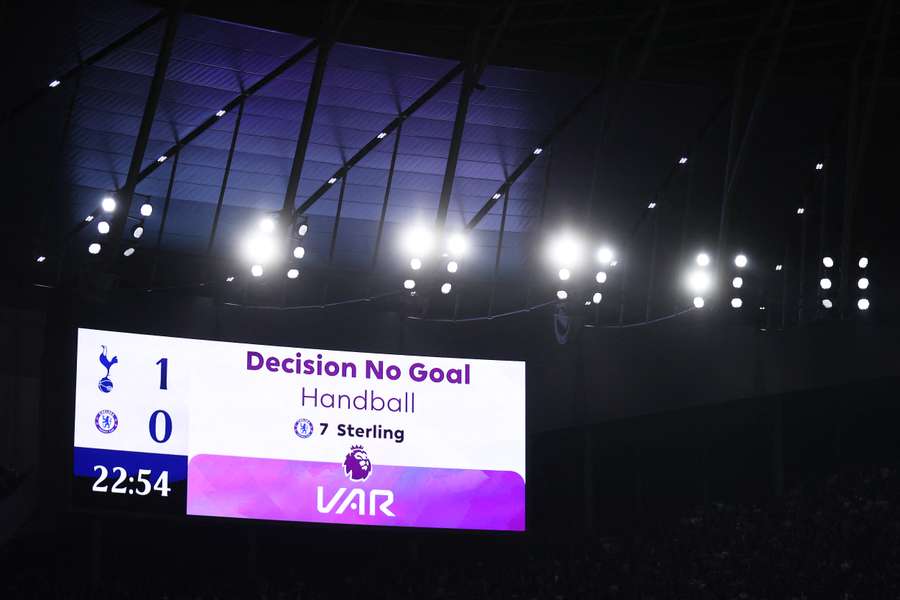VAR is becoming one of English football's biggest problems - opinion

The latest VAR debate stems heavily from the two north London clubs - Arsenal and Tottenham - and their managers' differing reactions to the impact both on-field referees and VAR had on their respective fixtures.
Mikel Arteta went on a sweeping rant about the standards of officiating and the difficulties his side faced during their controversial 1-0 loss against Newcastle.
"The result should not be what it is. Embarrassing what happened, how this goal stands, in the Premier League, this league we say is the best in the world," Arteta said.
"I've been 20 years in this country and now I feel ashamed. It's a disgrace and there's too much at stake here."
Contrast this to the approach of Ange Postecoglou, who had little interest in blaming the decisions but rather the process in which they are reached after his side lost 4-1 to Chelsea.
"There will be a forensic study of every decision out there, I think that is the way the game is going and I don't like it," he said.
"If you look at all that standing around we did today, maybe people enjoy that sort of thing, but I'd rather see us playing football.
"You have to accept the referee's decision, that is how I grew up. This constant erosion of the referee's authority is where the game is going - they are not going to have any authority."
Fair comments?
When you watch both games back and see all of the (almost countless) decisions the referees had to make, it seems that both managers' words hold some truth.
Arteta is correct in saying the standards of refereeing are not where they should be - although whether or not Newcastle's goal should have stood is up for debate, two clear red cards for Kai Havertz and Bruno Guimaraes were missed during the match.
Likewise, Postecoglou is onto something regarding how long it takes for each decision to be made.
During the first half of Spurs v Chelsea alone there were 12 minutes added time, which stemmed from numerous VAR stoppages.
In the end, it's fair to say the referees got the majority of decisions correct, but it resulted in one of the most entertaining fixtures of the season being filled with confusion and stop-start action - that was for the neutral observer watching at home, so just imagine the feelings of fans inside the stadium.
It should also be pointed out that the refereeing wasn't limited to just the two clubs mentioned.
Almost every side faces some sort of controversial decision every weekend.
Refereeing issues
There seems to be a new issue; another wrong decision, another manager rant based on the shortcomings of referees and VAR, after every game.
It's fast becoming one of the biggest problems faced in English football with no clear signs of anything being addressed or any meaningful changes being made.
Referee Anthony Taylor was recently demoted to the Championship after some poor showings in the Premier League.
He took charge of one game, made an incredibly controversial penalty call without the aid of VAR, and has now been selected for Manchester City's clash against Chelsea this Saturday.
What was the point, then, in 'punishing' the poor standards of officiating at all, if a return to the country's biggest fixtures is on the cards almost immediately?
As Arteta alluded to, the standards of refereeing are far too low.
The idea of VAR itself is a good one if applied properly, but the people applying it take far too long and still get the decisions wrong too often for it to be beneficial.
Then you get to the issue of using VAR in stadiums and the length of time it takes to reach any sort of decision at all.
The whole process, like Postecoglou mentioned, gets in the way of the actual football being played.
It's also important to remember that referees are going to make mistakes - just like players do numerous times throughout a match - but the whole point of VAR is to help the officials to limit those mistakes.
Currently, it just seems to magnify them and often make them far worse, the whole process hampering any sort of entertainment that should come with a football match.
In short, the idea of VAR works but the execution of it - by sub-par officials - is close to awful at times, resulting in the long delays that often sap the enjoyment out of a match.
The entire process needs an overhaul and referees have to improve to keep up with the standards required in the best league in the world.
English football boasts some of the best players, managers, stadiums, training facilities and has the most money - yet some of the worst referees and refereeing practices around.
Drastic change is needed to ensure the focus switches back to football and away from the officials, both on the pitch and watching on from a TV screen.

